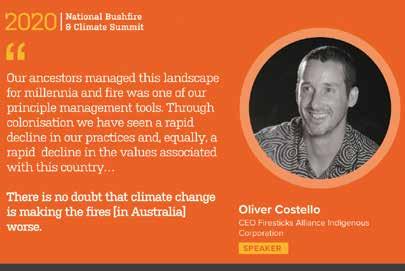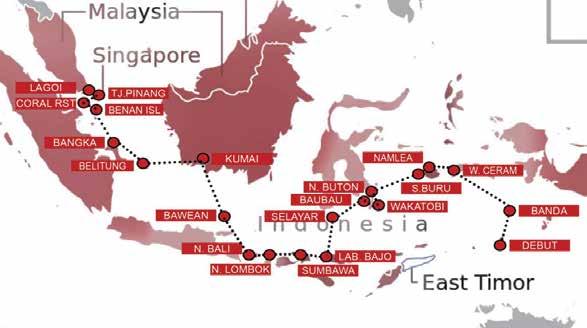
3 minute read
Sailors gather alongside Horn for next leg abroad
across Australia as Australia moves away from the use of fossil fuels towards an economy fuelled by renewable energy and focussed on protecting the environment we have left.
By amplifying their own voices and advocating for the protection of Country, they aim to raise awareness about the importance of preserving the environment.
Gudanji For Country also strives to elevate the voices of other First Nations communities, fostering unity and collective action.
4. Our Islands Our Home: https://ourislandsourhome.com. au/
Our Islands Our Home is a powerful campaign led by Torres Strait Islanders who are facing the frontline impacts of the climate crisis.
Rising sea levels, erosion, inundation, and coral bleaching threaten their homes and cultural heritage.
Our Islands Our Home seeks to protect the islands and preserve the unique cultures of Torres Strait Islander peoples.
Through their campaign, they are demanding urgent action and advocating for climate justice.
5. Seed: https://www.seedmob. org.au/our_story
Recognising Aboriginal and Torres Strait Islander youth have the most at stake in the face of climate change, Seed launched Australia’s first Indigenous youth-led climate network.
They aim to build a movement of young Indigenous people for climate justice, envisioning a future that is sustainable, just, and powered by renewable energy.
Seed empowers Indigenous communities to lead the way in finding solutions, putting people before profits and fostering healthier and cleaner societies.
Source: https://www. climatecouncil.org.au/
BY NADJA MACK
For the past week or more Horn Island has looked like a vibrant pop-up marina with more than 40 vessels crowding the strip between the wharf and the sandy mangrove island that shows itself at low tide.
Most were sail boats doing the 180-degree dance with the currents. White masts bobbing on perfectly turquoise water everywhere.
Among them was the 13-meter SV Ibex, named after an Alpine mountain goat.
The 2012 Sunbeam 42.1 is owned by the Austrian couple Vicky Weichsler and Florian Grassl.
They fondly call it the ‘BMW among sailing yachts’.
The enthusiastic sailors are in the third year of their sea journey around the world.
Over the next three months they will sail in the company of the Horn Island flotilla.
Their anchoring stops will be along Indonesia’s Spice Islands, mapped out by the organisers of the annual group rally

Sail 2 Indonesia
They started planning for their once-in-alifetime sailing trip five years ago from their then home in Germany.
They had no idea that a once-in-a-lifetime pandemic was waiting around the corner – just as they were ready to set sail, COVID hit.
It looked very much like their newly purchased boat, which was anchored five hours and two international borders away in Italy, might not go anywhere.
“For a while we thought our plans will fall victim to ‘once-ina-life time’ bad luck,” former consulatant Florian said.
“As it turned out, COVID made the trip even better.
When Italy, which was hit hard by COVID very early on, opened its borders temporarily, Vicky and Florian took their chance.
“We had only two months to get the boat ready,” he said.
“We hadn’t even done a night sail before we took off.
“People thought we were utterly mad.”
Fabian laughed at the memory, but they were on their merry way regardless.
While everyone else in the world was going in and out of lockdown, Vicky and Florian were able to enjoy a relatively empty ocean and tourist free destinations, only complicated by multiple COVID tests, quarantine rules and ‘lots of paperwork’.

“In some places which relied on tourism, we were welcomed with open arms,” former pharmaceutical industry project manager Vicky said.
“People were glad to see us because it meant tourists were coming back.”
The adventurous and sporty couple, in their 40s, are amongst the youngest sailors in the Sail 2 Indonesia cohort where the average age is around 60.
Many of the other sailors were retired, have sold their businesses or live on their pensions.
“We have saved for this trip,” Florian said.
“Our budget is planned to last for three to four years and so far, so good.”
He said the only cost they underestimated have been maintenance and repairs.
“We expected 10,000 to 20,000 Euros a year, it turned out to be 20,000 to 30,000 Euros,” he said.
Vicky and Florian have met many of their fellow sailors previously, some while sailing along the East Coast of Australia and others on route to Australia.
They said it was a small world out there, with common passages shared by many – even moreso post-COVID, with sea lovers catching up after the landlock of the pandemic years.
They spent ten days preparing for the passage from Horn Island to Indonesia, stocking up and getting things fixed.
Most of the boats cleared out last Sunday on their way Kei Island, about 700 nautical miles to the west.
Vicky and Florian will spend three months in Indonesia, before sailing on to Thailand in December.
Exactly four years after they took off, they plan to anchor their floating mountain goat for the last time.
Asked what they have missed the most during their sea adventure, they said, “going for walks”.
Once they are back home in Bavaria, where they were surrounded by mountains, they looked forward to plenty of opportunities to catch up on walking.
They agreed on one thing they wouldn’t miss about sea life, and that was fishing.
Or having conversations about fishing.
Neither of them like fish very much and they don’t fish.






